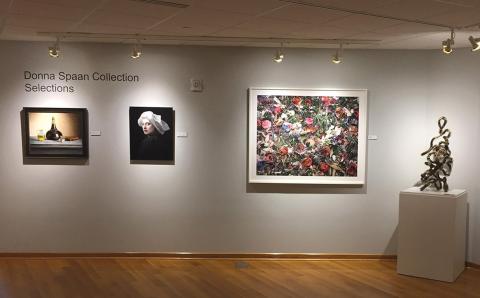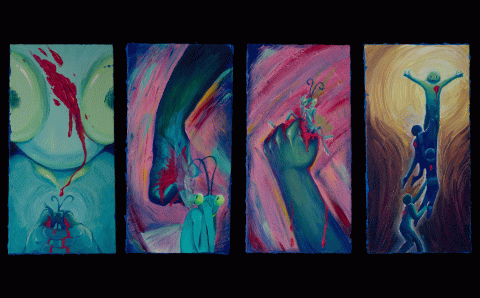New Banner
Thank you, thank you. I noticed “Punch Lines” is missing from the revamped Banner. That page bugged me so much. Jokes were too often profane, unfunny, or recycled from other sources. The few good ones certainly didn’t make up for the many bad ones. I am very glad you discontinued it.
Coby Veenstra, Dresden, Ont.
Since coming out with the “new” Banner I am having trouble reading it. Is the print smaller or a different font? I did look at an online app so I can adjust the size but prefer to hold a print version to read while relaxing in a chair. I would assume most readers of the print version would prefer a larger print.
Judy Strong, Pella, Iowa
Please, please bring back the joke page. Please!
Jeff Nelson, Guam
Mirror and Forum
We must all look in the mirror and look deeply inside ourselves to see where we are going and what makes us tick (“Mirror and Forum,” March 2018). And we need to look at the blind spots in our lives. Sadly, some leaders simply can’t do that because they misuse their power. They don’t listen, and they have their own agenda. My prayer is that God seeks me over and over again.
Andy A. Renema, Pitt Meadows, B.C.
The March issue was one of the best in recent memory. The editorial (“Mirror and Forum,” 2018) clearly spells out the basic mission of The Banner, and the subsequent articles deliver on those goals. What issues did the articles tackle? Challenging churches to welcome those with disabilities. Calling out America’s gun culture as idolatrous. Exploring what ethnic and racial diversity means to the church. Winsomely arguing that church unity makes us a more effective witness. Faithful stewardship of financial resources. The centrality of feelings in the Reformed faith. Pop-culture misogyny that degrades women. Principles of biblical hermeneutics.
This collection of articles emerged as a cohesive whole. Congratulations, Banner, and keep up the faithful work.
Steve Roels, Bath, Mich.
The Language of Feelings
Thanks for this, Ron! I found it helpful (“The Language of Feelings,” March 2018). I’ve wondered how the Western European cultures of the Reformers influenced the Reformation—did the Dutch and German tendency to “soldier on” (despite how one may feel) affect the theology we inherited from them? How was that theology culturally contextual? It was thought-provoking to read the quotes you shared from people like Calvin about the importance of feelings.
Danielle Steenwyk Rowaan, online comment
Love is a feeling, and also Jesus’ greatest command (“The Language of Feelings”). It’s feelings that elicit responses in us and thereby motivate us to Christ-like action. I don’t think it is the Reformed tradition that is so cerebral. My experience is that the immigrant mentality of the people was more responsible. Parents of my generation came to Canada and immediately put their nose to the grindstone to make successful lives for their families. Although church attendance was an essential element in that development, they didn’t allow themselves time for acknowledging and responding to feelings. I feel so blessed to be part of a church that readily acknowledges the work of the Holy Spirit in our lives and motivates us to love God, each other, and our neighbors who need us all around the world. It is the basis for all of the ministries our church is involved in, both near and far. The bonus? God blesses us by increasing our faith in him! Praise God!
Elly VanAlten, online comment
I found myself both empathizing with and objecting to “The Language of Feelings.” While God has certainly created human beings with the gift of emotions, we were also created with intellect for reasoning. Both are part of the whole. I have personally been grateful for my intellect during those challenging moments of life such as my walk with cancer or the loss of loved ones. In those low moments, it is easy to feel that God has abandoned me, but my intellect assures me that he has not done that. Since many biblical scholars see the heart, body, and soul as one component—in essence, our consciousness—it seems that the heart as it is used in Scripture is much more inclusive than only emotion.
Linda Vanderaa, Edgerton, Minn.
Editor’s Note: The article in question made this point: “We are not only to think and act Christianly; we are to feel Christianly.”
Food Ethics
I am a small organic dairy/egg farmer and would like to add to Matt Halteman’s article (“Eating toward Shalom,” March 2018) from the perspective of a farming family that is partly responsible for the health of the North American public. Since the industrial revolution, agricultural institutions have ingrained in the minds of farmers that they must become ever increasingly “efficient” and produce cheap food for the consuming public. But this thinking has come at a cost that we are only now starting to realize: health issues; soil nutrient depletion and erosion; and water and environmental concerns due to the overuse of pesticides, commercial fertilizers, and antibiotics.
Done properly, farming is an integral part of our communities, both in producing healthy food and being part of a “rural economic local” environment. I thank God every day for this talent that has been given me: to toil, to sweat, to teach my children, to deal with sickness and death, to see new life, to feel satisfied at the end of the day and rest—and finally to leave this Earth in better shape than I found it!
Marte Pronk, Harriston, Ont.
I am deeply disappointed about the article “Eating toward Shalom” from an academic with no real experience in agriculture. Not only does this piece romanticize agriculture from days of yore; it does not comprehend the advances in animal or crop sciences that have made farming much more than what it was in my grandfather’s day. If you are interested in farming or advances in agriculture, find a farmer to talk to. We are on social media trying to reach nonfarmers.
Jodi DeHate, Marion, Mich.
We now have undeniable evidence that North American food choices are having a detrimental effect on public health and on the health of the planet (“Eating toward Shalom”). Seven out of the top 10 causes of death in the U.S. are directly related to our overconsumption of ultra-processed foods and animal-based foods. Animal agriculture contributes significantly to greenhouse gas production (even more than all of the transportation sector), to excessive freshwater consumption, and to soil degradation. Adding to this, Matt Halteman raises important philosophical and ethical questions in this article that Christians should strongly consider as they make their daily decisions about what to eat. Those decisions contribute every bit as much to our integral mission and Christian witness as the testimonies we share about the gospel's redemptive power.
Dave Koetje, online comment
Guns in Church
Churches are going to be the next “soft target” after schools if they remain unprotected (“Big Questions,” March 2018). Many churches are miles away from police protection. To pray and not take action is like having a sick child and praying but not taking them to the hospital. We need to pray and also have a plan. Almost every victim of a shooting at a church, school, or concert thought it would never happen to them. Trained concealed-weapons holders could stop a small tragedy from turning into a big one. What plan does your church have?
David Vander Sluis, Holland, Mich.
Black History
I really enjoyed reading about the African-American leaders in the CRC (“Making Black History in the Christian Reformed Church,” Feb. 2018). What gifted, anointed people! They have been used greatly in our church. I would have liked to have had their names under their pictures, though.
John Otte, Grand Rapids, Mich.
Identifying people by name is a sign of respect. I was dismayed to see names omitted from the faces of eight African Americans who have made significant contributions to the CRC (“Making Black History in the Christian Reformed Church”). Their names were omitted from the cover and from the same composite of photos with Reginald Smith’s fine article. Only by reading the tiny print on page 4 could I match the names of the people described in Smith’s story to the faces of these faithful servants of God. It would also have been helpful to have found a photograph of James Allen, described by Smith as “one of the denomination’s first African-American worship directors,” to include with the others.
Judy Parr, Holland, Mich.








